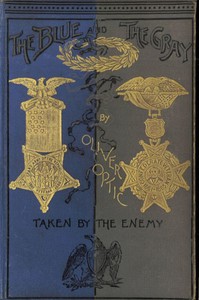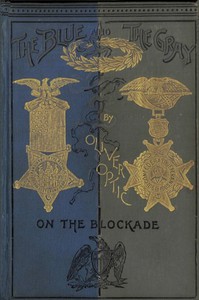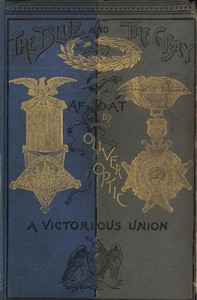Taken by the Enemy, the Enemy by Oliver Optic [the beach read TXT] 📗

- Author: the Enemy by Oliver Optic
Book online «Taken by the Enemy, the Enemy by Oliver Optic [the beach read TXT] 📗». Author the Enemy by Oliver Optic
"What do you believe to be her best speed, Mr. Vapoor?"
"I have never had the opportunity to test it, but I believe that she can make more than twenty knots, possibly twenty-two. You remember that Captain Passford was in a desperate hurry to get from Messina to Marseilles a year ago this month, and the Bellevite logged twenty knots during nearly the whole of the trip," replied the engineer, with a gentle smile of triumph on his handsome face, for he looked upon the feat of the engine as he would upon a noble deed of his father.
"You made her shake on that trip, Mr. Vapoor."
63 "Not very much, sir. All the owner's family, including Miss Florry, were on board then, and, if any thing had happened, I should have charged myself with murder. I do not know what the Bellevite could do if the occasion warranted me in taking any risk."
"I do not wish you to be reckless on the present emergency; but it is of the utmost importance to save every hour we can, and the success or failure of the expedition may depend upon a single hour. I will say no more, though an accident to the engine would be a disaster to the enterprise. I leave the matter with you, Mr. Vapoor," added the commander, as he moved off.
"I understand you perfectly, Captain Breaker, and there shall be no failure in the engine department to meet your wishes," replied the chief, as he touched his cap and retired to the engine-room.
"I am waiting for you, Breaker," said Captain Passford, who was standing near the companionway with Christy.
"Excuse me for a few minutes more, for there seems to be a strong breeze coming up from the north-east, and I want to take a look 64 at the situation," replied the commander, and he hastened forward.
It had been bright sunshine when the pilot came on board: but suddenly the wind had veered to an ugly quarter, and had just begun to pipe up into something like half a gale. Captain Breaker went to the pilot-house, looked at the barometer, and then directed Mr. Dashington to crowd on all sail, for he intended to drive the vessel to her utmost capacity.
The Bellevite was rigged as a barkantine; that is, she was square-rigged on her foremast, like a ship, while her main and mizzen masts carried only fore-and-aft sails, including gaff-topsails. The shrill pipe of the boatswain immediately sounded through the vessel, and twenty-four able seamen dashed to their stations. In a few minutes, every rag of canvas which the steamer could carry was set. But the commander did not wait for this to be done, but hastened to join the owner.
"I suppose you don't want me, sir," said Christy, as his father led the way into the cabin.
"On the contrary, I do want you, Christy," replied Captain Passford, as he halted, and the 65 commander passed him on his way to the cabin. "I wish you to understand as well as I do myself what we are going to do."
"I shall be very glad to know more about it," added Christy, pleased with the confidence his father reposed in him in connection with the serious undertaking before him.
"In the work I have to do, you stand nearer to me than any other person on board," continued Captain Passford. "I know what you are, and you are older than your sixteen years make you. It was at your age that Charles XII. took command of the armies of Sweden, and he was more than a figure-head in his forces."
"Sometimes I feel older than I am," suggested the boy.
"I believe in keeping a boy young as long as possible, and I have never hurried you by putting you in an important place, though at one time I thought of having a third officer, and assigning you to the position, for the practice it would give you in real life; but I concluded that you had better not be driven forward."
"I think I know something about handling a steamer, father."
66 "I know you do; though I have never told you so, for I did not care to have you think too much of yourself. Now, in common with all the rest of us, you are hurled into the presence of mighty events; and in a single day from a boy you must become a man. You are my nearest representative on board; and if any thing should happen to me, in the midst of the perils of this expedition, a responsibility would fall upon you which you cannot understand now. I wish to prepare you for it," said Captain Passford, as he went down into the cabin.
The commander was already seated at the table, waiting for the owner; and Captain Passford and Christy took places near him. The cabin was as elegant and luxurious as money and taste could make it. In the large state-room of the owner there was every thing to make a sea-voyage comfortable and pleasant to one who had a liking for the ocean.
Leading from the main cabin were the state-rooms of Florence and Christy. One of the four others was occupied by Dr. Linscott, the surgeon of the ship, who had had abundant experience in his profession, who had been an army surgeon 67 in the Mexican war, though his health did not permit him to practise on shore.
Another was occupied by the chief steward, who was a person of no little consequence on board; while the others were appropriated to guests when there were any, as was often the case when the Bellevite made short voyages.
The trio at the table began the discussion of the subject before them without delay; but it is not necessary to enter into its details, since, whatever plans were made, they must still be subject to whatever contingencies were presented when the time for action came.
Forward of the main cabin was what is called in naval parlance the ward-room, and it was called by this name on board of the Bellevite. In this apartment the officers next in rank below the commander took their meals; and from it opened the state-rooms of the first and second officers on the starboard-side, with one for the chief engineer on the port-side, and another for his two assistants next abaft it.
The commander was an old friend of the owner, and messed with him in the main cabin, though his state-room was a large apartment 68 between the cabin and the ward-room; the space on the opposite side of the ship being used for the pantries and the bath-room.
Before the conference in the cabin had proceeded far, the motion of the steamer, and the creaking of the timbers within her, indicated that Mr. Vapoor was doing all that could be required of him in the matter of speed, though the pressure of canvas steadied the vessel in the heavy sea which the increasing breeze had suddenly produced. Before night, the wind was blowing a full gale, and some reduction of sail became necessary.
The Bellevite had the wind fair, and the most that was possible was made of this accessory to her speed. At one time she actually logged the twenty-two knots which the chief engineer had suggested as her limit, and inside of two days she reached her destination. Christy had suddenly become the active agent of his father, and he was the first to be sent on shore to obtain information in regard to the guns and ammunition, for it was thought that he would excite less suspicion than any other on board.
69 CHAPTER VI MR. PERCY PIERSON INTRODUCES HIMSELFChristy procured the desired information on shore; and being but a boy, he obtained no credit for the head he carried on his shoulders, so that no attention was given to him when he made his investigation. At the proper time Captain Passford appeared; but, as the guns and other war material were intended for the other side in the conflict, he was obliged to resort to a little strategy to obtain them.
But they were obtained, and the Bellevite was as fully armed and prepared for an emergency as though she had been in the employ of the Government, as it was intended that she should be when her present mission was accomplished. During her stay at St. George, such changes as were necessary to adapt the vessel to her enterprise—such as the fitting up of a magazine—were completed, and the steamer sailed.
70 After a quick passage, the Bellevite arrived at New Providence, Nassau, where she put in to obtain some needed supplies, as it was directly on her course. Already there was not a little activity at the principal foreign ports nearest to the Southern States, created by the hurried operations of speculators anxious to profit by the war that was to come; and later these harbors were the refuge of the blockade-runners.
The arrival of the Bellevite at New Providence created not a little excitement among the Confederate sympathizers who had hastened there to take advantage of the maritime situation, and to procure vessels for the use of the South in the struggle. The steamer was painted black, and, as she had been built after plans suggested by her owner, she was peculiar in her construction to some extent, and her appearance baffled the curiosity of the active Confederate patriots and speculators alike; for both classes were represented there, though not yet in large numbers.
Captain Passford had instructed the commander to conceal all the facts in regard to her, and no flag or any thing else which could betray her nationality or character was allowed to be seen. 71 The business of obtaining the needed stores required many of the officers and men to go on shore, but all of them were instructed to answer no questions. No one was allowed to come on board.
"Good-morning, my friend," said a young man to Christy, as he landed on the day after the arrival.
"Good-morning," replied the owner's son, civilly enough, as he looked over the person addressing him, who appeared to be a young man not more than eighteen years old.
"What steamer is that?" continued the stranger, pointing to the steam-yacht.
Christy looked at his interlocutor, who was a pleasant-looking young man, though there was something which did not appear to be quite natural in his expression; and he suspected that he had been placed at the landing to interrogate him or some other person from the steamer, in regard to her character and nationality. Possibly he derived this idea from the fact that he had himself been employed on a similar duty at St. George.
"Do you mean that schooner?" asked Christy 72 carelessly, as he pointed at a vessel much nearer the shore than the Bellevite.
"No, not at all," replied the stranger. "I mean that steamer, off to the north-east," replied the young man, pointing out into the bay.
"North-east?" added the owner's son. "That is this way;" and he turned about, and directed his finger towards the interior of the island. "That would put the craft you mean on the shore, wouldn't it?"
"Not a bit of it! I don't mean that way. Don't you know the points of the compass?"
"I learned them when I was young, but I forget them now."
"Pray how old are you, my friend?" asked the stranger, who thought his companion was stupid enough to answer any question he might put to him.
"I was forty-two yesterday; and in a year from yesterday, I shall be forty-three, if I don't die of old age before that time," replied Christy, looking the other full in the face, and with as serious an expression as he could command.
"Forty-two! You are chaffing me. Didn't you come from that steamer over there?" 73 demanded the young man, pointing at the Bellevite again.
"No, sir. I came from China, from a place they call Shensibangerwhang. Were you ever there?"
"I never was there, and I question if you were ever there."
"Do you mean to question my veracity?" demanded Christy, knitting his brow.
"Oh, no, not at all!"
"Very well; and when you go to Shensibangerwhang, I shall be glad to see you; and then I will endeavor to answer all the questions you desire to ask."
"I thought you came from that steamer over there."
"Thought made a world, but it wasn't your thought that did it."
"Of course you know the name of that steamer."
"Oh, now I think of her name! That is the Chicherwitherwing, and she belongs to the Chinese navy. She is sent out on a voyage of discovery to find the north pole, which





Comments (0)